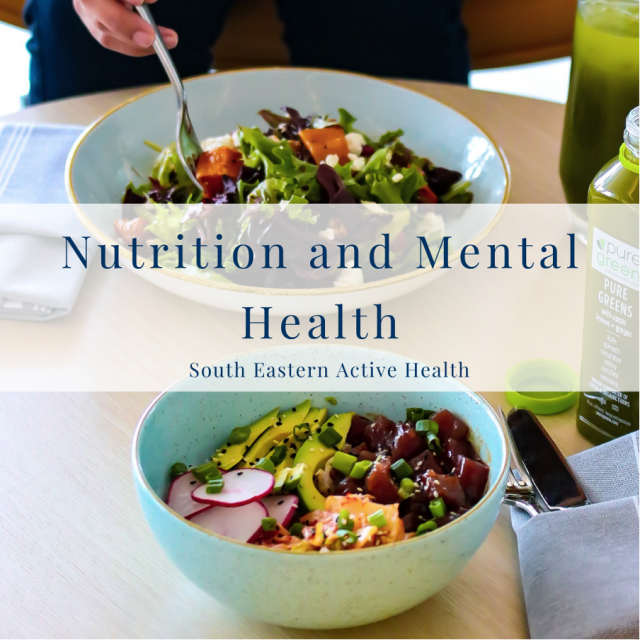
Nutrition for mental health
We often think of the role diet and nutrition plays in improving physical health – from performance in sport to preventing lifestyle-related disease such as cardiovascular disease and type 2 diabetes. But, what can nutrition do for our mental health?
In light of World Mental Health Day, today we’re taking a look into some of the standout nutrients for cognitive function and mental wellbeing.
Mediterranean-style diets
The benefits of the Mediterranean diet have been well explored and researched in reducing the risk of heart disease, type 2 diabetes, improving weight and enhancing longevity. In 2017, a research study termed the ‘SMILES’ trial, investigated the impact of a Mediterranean-style dietary intervention over 12 weeks with support from a dietitian, as an adjunctive treatment for depression.(1)
This dietary approach focussed on improving dietary quality, eating more whole-food groups including vegetables, whole grains, fruit, legumes, low-fat and unsweetened dairy foods, nuts, fish, lean meat and poultry, eggs and olive oil. Intake of sweets, refined cereals, fried food, processed meats, drinks with added sugar and alcohol (red wine was preferred, with meals) were reduced.
In addition, the personalised dietary advice was combined with goal setting, mindful eating and nutritional counselling support from a clinical dietitian.
Those who received the dietary support were compared to a group who only received social support.
It was found that receiving the additional dietary support resulted in significantly greater improvement in depression-rating scores than those who had social support alone.
While the research is still in its infancy, it indicates the potential of dietary improvement guided by a dietitian for improving mental health and managing depression. Keep reading below for more info…
Need help with your Nutrition? Book with our Dietitian and Nutritionist Rebecca below
Let’s explore specific nutrients and food approaches that may support mental health.
Omega -3 fatty acids
Found in largely from marine sources such as oily fish, omega-3 fats are essential for healthy brain development and function. They make up part of our brain cells and have anti-inflammatory properties which protect the health of brain cells. Including adequate omega-3 fats in the diet also appears to have flow on benefits for mental health.
Oily fish such as salmon, sardines, mackerel and fish oil are the best sources of omega-fats. Aim to eat 2-3 serves of oily fish per week to obtain a health amount of these fats. Other forms of omega-3 can also be found in walnuts, flaxseeds and chia seeds. The type of omega-3 found in nuts and seeds is not as easily converted into the form that we find in marine sources, so for those who don’t eat much fish, supplementing with fish oil or algae-oil may be of benefit.
Antioxidants
It’s likely you’ve heard of antioxidants before in relation to their benefits for health, but what do they really do for the body?
Antioxidants are a protective mechanism from the damaging effects of compounds called free radicals. Free radicals can form in excessive amounts from smoking, drinking too much alcohol, air pollution and unhealthy environments and excess intake of highly processed foods. They can cause oxidative stress in the body and can damage healthy cells, which can put health at risk of conditions such as cardiovascular disease, cancer and degenerative brain conditions such as dementia.
Luckily, antioxidants work to counteract the effects of free radicals by “neutralising” them and reducing oxidative stress in the body. A reduction in oxidative stress may help as an adjunct therapy in anxiety and depression.
Antioxidants are abundant in food, with some of the best sources include berries, beans and legumes (red kidney beans, black beans), green leafy vegetables (broccoli, kale, spinach), nuts (walnuts, pecans), tea (green and black tea), dark chocolate and herbs and spices. All these foods happen to form a part of a Mediterranean-style diet.
Fibre, pre-biotics and pro-biotics
Did you know that the gut and the brain communicate to each other directly through a pathway known as the gut-brain-axis? Due to this connect, optimising the health of the gut may have flow-on effects to improving cognitive health and mental health. Central to good gut health is the gut microbiome. This is the community of bacteria that reside in the gut (mainly the large intestine). Due to the gut-brain connection, an imbalance in the gut microbiome, called gut dysbiosis, may also impact the brain in areas such as mood and cognition.
So how can you look after your gut with food? Consuming a diet rich in fibre, prebiotic foods and fermented foods (some of which contain probiotics) are key dietary components to nourish gut health. Fibre not only helps to keep your gut moving and keep you regular, it also helps to nourish the gut microbiome. Certain types of fibre contain prebiotics which act as fuel for gut bacteria. Prebiotics pass through the small intestine undigested and make their way to the large intestine where the gut bacteria ferment on these to produce compounds which benefit the health of the gut and body. Examples of prebiotic-rich foods include garlic, onion, leek, chicory root, legumes and lentils, peaches, nectarines, dried fruit (dates, figs), rye, barley, wheat bran, cashews, pistachios.
Resistant starch is another form of fibre which acts as a prebiotic which benefits the gut microbiome. It is found in green bananas, oats, cooked and cooled potatoes and rice.
Some fermented foods contain live microorganisms and beneficial probiotics which are bacterial species that can have benefits for digestion and overall health. Eating fermented foods regularly is another way of optimising your diet to improve gut health. Try including fermented foods such as yoghurt with live cultures, kefir, sauerkraut, kimchi and pickles.
Mindful Eating
With so many conflicting diet messages we are exposed to, it’s easy for food to become stressful and overwhelming, which can negatively affect mental health.
Mindful eating techniques involve moving attention away from external influences and focussing more internally towards your own hunger and fullness levels and understanding which foods make you feel you best. Being mindful around food and having more awareness of how, why and what you eat can help to reduce the stress, worry and guilt around eating.
Mindful eating can help to facilitate a healthier relationship with food which can improve overall health and wellbeing.
If you’d like to learn how our dietitian, Rebecca, helps clients use dietary approaches to improve nutrition, gut health and use mindful eating techniques to build a healthy relationship with food, read more here or send us an email to reception@activehealth.com.au.
References:
1. Jacka F, O’Neil A, Opie R, Itsiopoulos C, Cotton S, Mohebbi M et al. A randomised controlled trial of dietary improvement for adults with major depression (the ‘SMILES’ trial). BMC Med. 2017 Jan 30:15(1):23.

